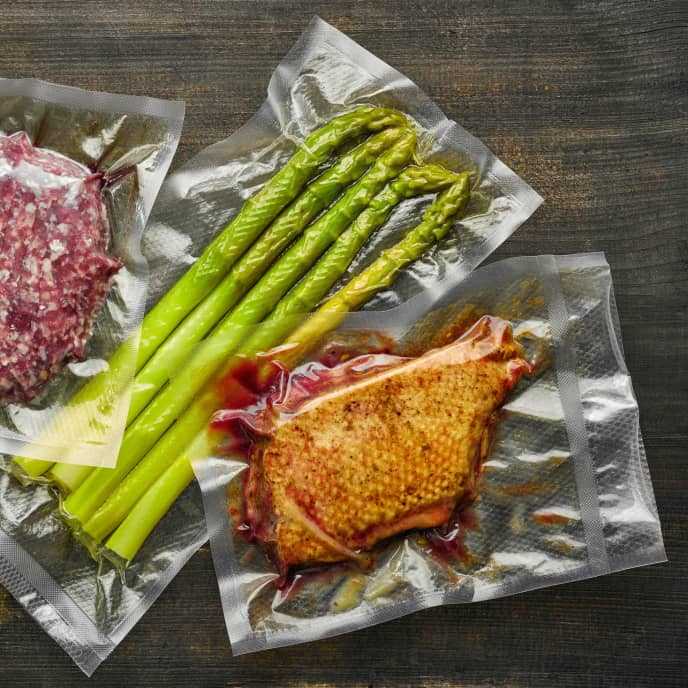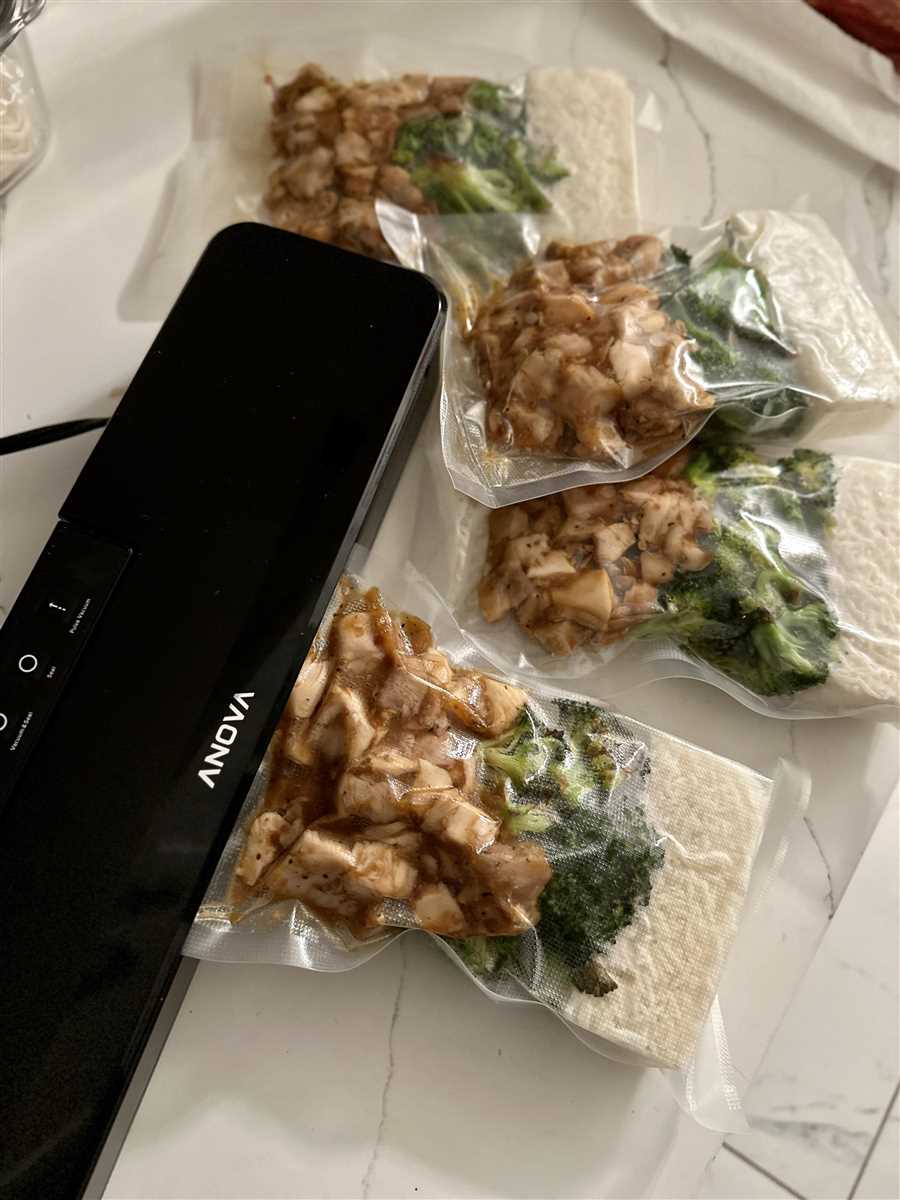Vacuum sealing is a popular method for preserving food, but many people wonder if it can be used for cooked food as well. The answer is yes, you can vacuum seal cooked food. In fact, vacuum sealing is a great way to extend the shelf life of cooked meals and leftovers.
When you vacuum seal cooked food, you are removing the air from the package, which helps to prevent the growth of bacteria and other microorganisms that can cause food spoilage. The absence of air also helps to preserve the flavor, texture, and nutritional value of the food.
Before vacuum sealing cooked food, it’s important to let it cool completely. This is because vacuum sealing hot food can create condensation inside the package, which can lead to bacterial growth. Once the food has cooled, you can place it in a vacuum sealer bag or container, remove the air, and seal it tightly.
It’s worth noting that vacuum sealed cooked food can be stored in the refrigerator or freezer. In the refrigerator, vacuum sealed cooked food can last up to two weeks, while in the freezer, it can last for several months.
In conclusion, vacuum sealing is a safe and effective method for preserving cooked food. By removing the air from the package, you can extend the shelf life of your meals and leftovers, while also maintaining their quality and taste.
Benefits of Vacuum Sealing Cooked Food
-
Extended Shelf Life: Vacuum sealing cooked food can significantly extend its shelf life. By removing the oxygen, bacteria, mold, and other microorganisms that cause food spoilage cannot thrive. This allows cooked food to stay fresh for longer periods, reducing waste and saving money.
-
Preservation of Nutrients: Vacuum sealing locks in the nutrients and flavors of cooked food. The absence of air prevents oxidation and helps retain vitamins, minerals, and antioxidants. This means that vacuum sealed food retains its nutritional value for longer, ensuring that you receive the maximum health benefits.
-
Convenience: Vacuum sealed cooked food is extremely convenient for meal planning and preparation. With vacuum sealing, you can cook large batches of food and portion it out into individual servings. These sealed portions can then be easily stored in the refrigerator or freezer, ready to be reheated whenever you need a quick and easy meal.
-
Protection from Freezer Burn: When food is stored in the freezer for a long time, it is vulnerable to freezer burn. Freezer burn occurs when moisture in the food turns into ice crystals, causing it to become dehydrated and develop a dry, unpleasant texture. Vacuum sealing eliminates the air that causes freezer burn, keeping your cooked food fresh and maintaining its quality.
-
Enhanced Flavor: Vacuum sealing cooked food can enhance its flavor by allowing it to marinate and infuse with spices, herbs, and seasonings. When food is sealed in a vacuum bag, it creates a sealed environment where flavors can permeate the food more effectively. This results in more flavorful and delicious meals.
-
Organized Storage: Vacuum sealing cooked food helps in maintaining an organized storage system. With individual portions sealed in vacuum bags, you can neatly stack them in the refrigerator or freezer, optimizing space and making it easier to find what you need. This eliminates the need for bulky containers and reduces clutter in your kitchen.
Preserves Freshness

Vacuum sealing cooked food is an excellent way to preserve its freshness. The vacuum sealing process removes the air from the package, which helps prevent the growth of bacteria and other microorganisms that can spoil the food. By removing the air, vacuum sealing also reduces oxidation, which can cause food to deteriorate and lose its flavor.
When cooked food is vacuum sealed, it remains tightly sealed, protecting it from exposure to oxygen and moisture. This helps to extend its shelf life and maintain its taste and texture for a longer period of time.
Another benefit of vacuum sealing cooked food is that it prevents freezer burn. Freezer burn occurs when ice crystals form on the surface of frozen food, causing it to become dehydrated and develop a dry, discolored appearance. Vacuum sealing eliminates the contact between the food and the air, reducing the risk of freezer burn and preserving the quality of the food.
Vacuum sealing also allows you to conveniently portion and store cooked food. By sealing individual servings, you can easily grab and reheat a meal whenever you need it. This is especially beneficial for busy individuals or families who want to enjoy home-cooked meals without the hassle of cooking each time.
Benefits of vacuum sealing cooked food:

- Prevents the growth of bacteria and other microorganisms
- Reduces oxidation and maintains flavor
- Extends shelf life
- Prevents freezer burn
- Allows for convenient portioning and storage
Extends Shelf Life
Vacuum sealing cooked food is a great way to extend its shelf life. By removing the oxygen from the packaging, vacuum sealing helps to slow down the growth of bacteria and molds that can cause food spoilage.
When cooked food is exposed to air, it can start deteriorating quickly due to the presence of oxygen. This oxidation process can lead to changes in the color, taste, and texture of the food. Vacuum sealing prevents this process by creating an airtight seal around the food, limiting its exposure to oxygen.
Additionally, vacuum sealing also helps to prevent freezer burn. Freezer burn occurs when the moisture in the food evaporates, leaving it dehydrated and prone to developing off-flavors and textures. By vacuum sealing cooked food before freezing, you can significantly reduce the likelihood of freezer burn, allowing the food to retain its quality for a longer period of time.
The extended shelf life provided by vacuum sealing cooked food not only helps to reduce food waste but also allows you to enjoy your favorite meals at a later time without compromising their taste and quality.
Prevents Freezer Burn
One of the main benefits of vacuum sealing cooked food is that it helps prevent freezer burn. Freezer burn occurs when frozen food is exposed to air, which causes dehydration and oxidation. This can result in changes to the texture and taste of the food, making it less enjoyable to eat.
By vacuum sealing cooked food, you can remove all the air from the package, creating a tight seal that prevents air from coming into contact with the food. This helps to maintain the quality and freshness of the food for a longer period of time.
When the food is sealed, it is also protected from the drastic temperature fluctuations that can occur in the freezer. These fluctuations can lead to the formation of ice crystals, which can further damage the texture and taste of the food.
Additionally, vacuum sealing cooked food helps to prevent cross-contamination in the freezer. By ensuring that the food is sealed and separated from other items, you can reduce the risk of flavors and odors transferring between different foods.
Overall, vacuum sealing cooked food is an effective method for preventing freezer burn and preserving the quality of your food. It helps to maintain the texture, taste, and freshness of the food, allowing you to enjoy it for a longer period of time.
Saves Money
One of the main benefits of vacuum sealing cooked food is that it can save you money. By vacuum sealing your cooked meals, you can extend their shelf life, reducing the amount of food wasted. This can be especially beneficial for individuals or families who struggle with meal planning or those who often find themselves throwing away leftovers.
When you vacuum seal cooked food, it helps to preserve its freshness and flavor for a longer period. This means that you can buy food items in bulk and store them for longer without worrying about them spoiling. By buying in bulk, you can take advantage of discounts or sales, saving money in the long run.
| Benefits of Vacuum Sealing Cooked Food: |
|---|
| Extends shelf life |
| Reduces food waste |
| Allows for bulk purchases |
| Saves money in the long run |
Additionally, vacuum sealing cooked food can also help you save money by preventing freezer burn. Freezer burn occurs when food is exposed to air in the freezer for an extended period, causing dehydration and loss of flavor. By vacuum sealing your cooked meals, you create an airtight seal that prevents freezer burn, keeping your food fresh and tasty.
Overall, vacuum sealing cooked food is a cost-effective way to extend the shelf life of your meals and reduce food waste. By doing so, you can save money by buying in bulk, preventing freezer burn, and ensuring that your leftovers stay fresh for longer.
Convenient Meal Planning
Meal planning is an essential part of maintaining a healthy diet and optimizing time and money spent on food. Vacuum sealing is a great tool that can make meal planning even more efficient and convenient.
With vacuum sealing, you can easily prepare and store meals in advance, allowing you to have ready-to-eat dishes whenever you need them. The process involves using a vacuum sealer to remove air from storage bags or containers, ensuring airtight packaging that helps to preserve the freshness and quality of food for longer periods.
When it comes to cooked food, vacuum sealing can be a game-changer. You can vacuum seal leftovers, pre-cooked meals, and even ingredients for future recipes. This allows you to extend the shelf life of cooked food by preventing spoilage and freezer burn.
One of the benefits of vacuum sealing cooked food is that it helps to retain the flavors and textures of the dishes. By removing air and sealing the food tightly, you are preventing the oxidation process that can lead to flavor loss. This means that when you reheat and serve the vacuum-sealed cooked food, it will taste just as good as when it was freshly cooked.
Additionally, vacuum sealing cooked food can save you time and effort in the kitchen. Instead of spending hours cooking every day, you can prepare larger quantities of your favorite dishes and vacuum seal them into individual portions. This way, you can simply reheat and enjoy a home-cooked meal in a matter of minutes.
Overall, vacuum sealing cooked food is a convenient way to plan and prepare meals in advance. Whether you are looking to save time, reduce food waste, or have a well-stocked freezer for busy days, vacuum sealing can be a valuable tool in your meal planning arsenal.
Questions and answers
Can you vacuum seal cooked food?
Yes, you can vacuum seal cooked food. Vacuum sealing is a great way to preserve cooked food for a longer period of time.
How does vacuum sealing help in preserving cooked food?
Vacuum sealing removes all the air from the package, which helps to prevent the growth of bacteria that can cause food spoilage. It also helps to retain the flavor and texture of the cooked food.
What types of cooked food can be vacuum sealed?
You can vacuum seal a wide variety of cooked food, including soups, stews, casseroles, cooked meats, and leftovers. It is important to cool the food before vacuum sealing it.
How long can vacuum sealed cooked food last?
Vacuum sealed cooked food can last for a significantly longer time compared to regular storage methods. Depending on the type of food, it can last anywhere from a few days to several weeks in the refrigerator, and even longer in the freezer.
Are there any precautions to take when vacuum sealing cooked food?
When vacuum sealing cooked food, it is important to make sure the food is properly cooled before sealing it. This helps to prevent the growth of bacteria. It is also important to use proper food storage bags or containers that are specifically designed for vacuum sealing.






